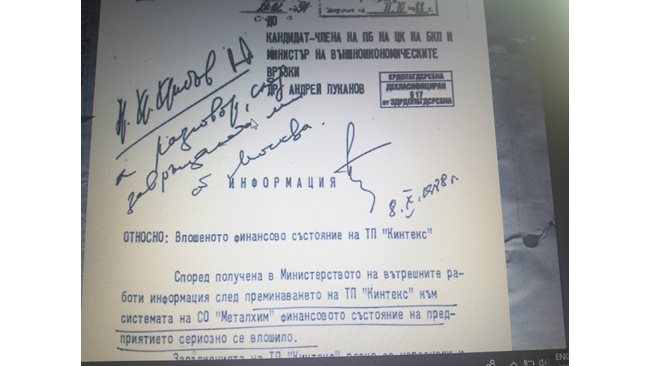–
–
The front page of the secret report to Andrei Lukanov on the problems in Kintex
–
The state-owned enterprise, which is still the subject of scandals, had almost BGN 600 million in debt 34 years ago.
Purchased military products that are not in demand on the market and are not secured by foreign contracts, shows a secret report
They assembled parts of Soviet production and exported them as products made in our country
Can the powerful company for trade in weapons and ammunition in our country “Kintex” be on the verge of financial survival? It turns out that it is possible and this happened back in 1988.
The state-owned company, which has been the subject of scandals in recent months and has revenues of BGN 222 million and a profit of BGN 20.6 million in 2020, had liabilities of BGN 598 million 34 years ago. This shows a secret “Information about the deteriorating financial condition of the trade enterprise” Kintex “from October 7, 1988 of Interior Minister Dimitar Stoyanov to Andrei Lukanov, then Minister of Foreign Economic Relations.
The Kintex enterprise, shrouded in mystery during the socialist years, was established by secret order 131 of the Council of Ministers in July 1966. The foreign trade union was to export “special property in the second direction” (in foreign currency). The name of the company comes from the Office for Engineering and Technical Exports at the Ministry of Foreign Trade. There is another, more amusing interpretation – the name comes from “hardware” and “textiles”.
In June 1967, only a year after the establishment of the enterprise, with a new top secret order of the Council of Ministers, “transit trade” was added to its activities. It includes “hidden transit” of weapons and ammunition, special property, cigarettes and alcohol, luxury goods, gold, medicines under the control of the World Health Organization, banned drugs, psychotropic substances, etc., placed under special international control. For this purpose
Kintex is building a network of offshore companies,
most of which are registered in Liechtenstein with a difficult-to-understand owner. Huge foreign exchange earnings from a kind of state-sponsored smuggling were transferred there. The enterprise was under the direct supervision of the Ministry of Interior and the State Security.
The special purpose of Kintex, apart from legal trade, was reaffirmed by a decision of the Council of Ministers in 1978. It ordered that the hidden transit trade through the People’s Republic of Bulgaria be carried out only by the State Trade Enterprise Kintex and the representative offices of Kintex companies in the People’s Republic of Bulgaria. ”. This includes “trade on land, air and sea with goods placed under a special international trade regime, goods with special qualities and high values, for which suppliers do not have an official permit for transit through Bulgaria’s neighboring countries and import permit for the recipient country” .
In this way, Kintex worked until 1985, when the “hidden transit” was terminated by a decision of the Council of Ministers. After that the enterprise passes to the system of Metalchim Business Association. It was established at the end of 1948 as a union of military factories. From 1975 to 1989 Metalchim established 28 machine-building plants of the military industry in Kazanlak, Sopot, Sofia, Karlovo, Lovech and others.
After the transition of Kintex to the system of Metalchim Municipality, the financial condition of the company has seriously deteriorated. Liabilities increased sharply and amounted to BGN 598 million. This was a result of the decision imposed by the management of Kintex to buy from the manufacturers products that are not in demand on the market and are not secured by external contracts. Products worth BGN 132.5 million were bought and left for safekeeping, ”Interior Minister Dimitar Stoyanov wrote anxiously to Andrei Lukanov in information dated October 7, 1988.
There were difficulties in selling the goods abroad, untimely collection of receivables for exported products, as well as due to the delayed payment by the factories of the machines and equipment delivered to them by Kintex in the second direction for over BGN 40 million by him, no funds were provided to repay a short-term unscheduled loan of BGN 300 million. At the end of August, the Bulgarian Foreign Trade Bank
informed Kintex that the purchase of goods for export under safekeeping will be suspended until the final repayment of the loan
and will only pay for products that have already been shipped abroad, the secret document said.
Thus, the company was not able to pay the plants for the products produced, which in turn had an “adverse effect on the remuneration of labor collectives and poses a risk of social tensions.” The services have received information that military products are being bought in rubles from the USSR and Czechoslovakia, which the military factories report as their own products. Examples are also given. Through the General Engineering Directorate, cannons for 3 million shots for ZU-23 (anti-aircraft gun) were purchased from these countries and provided for export as own production to the Friedrich Engels plant (today Arsenal). In the same way, the tractor plant in Karlovo reported the 500 ATGMs Malyutka (anti-tank guided missile) purchased from Czechoslovakia.
It is stated that
if possible for annual production up to 15 thousand pieces of the product “City” (missiles for rocket-propelled grenade launchers) through “Kintex” were exported over 200 thousand pieces
The difference was supplemented by quantities delivered from the USSR in bulk, which after assembly and re-marking were reported as made in the system of SO “Metalchim”, added Minister Stoyanov.
“As a result of these machinations, the union reported a reduction in material and production costs by 4-5%, thus misleading higher organizations about the actual volume of production and the real capabilities of the plants,” said in a statement. the Prime Minister Georgi Atanasov was also acquainted.
–


:quality(75)/cloudfront-us-east-1.images.arcpublishing.com/elcomercio/7GQKKUJ3X5AGXBL32D3AYAUNXM.jpg)